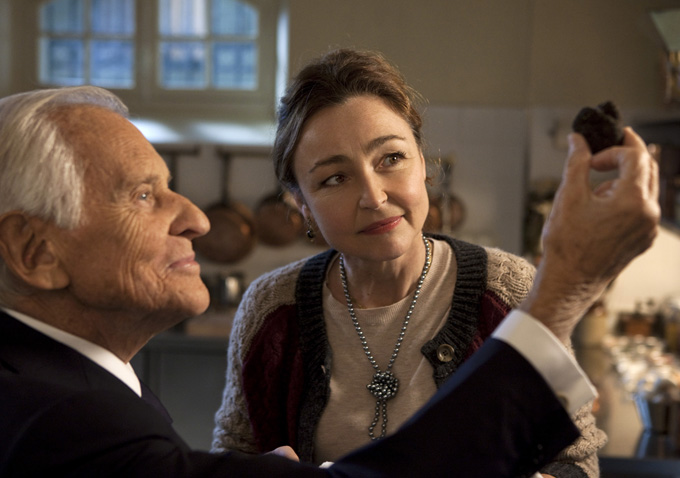
Loosely based on the life of French president François Mitterrand’s personal chef, “Haute Cuisine” is a cream puff of a film. It’s sweet and airy without much nutritional value. You will definitely leave the movie hungry, largely because each dish created by Catherine Frot’s Hortense Laborie is more mouthwatering than the last. Do not make the mistake of going to the theater on an empty stomach, because “Haute Cuisine” is like looking at food porn on Pinterest for two hours. We’ll be craving truffles on buttered toast for weeks.

The film is framed by Hortense’s time as a cook at the Alfred Faure base in Antarctica, skipping back to her work at the Élysée Palace. She begins her life at the palace when she’s whisked from her bed and breakfast in Perigord to Paris, based solely on the word of Joel Robuchon. President Mitterrand (Jean d’Ormesson) has tired of the overly fancy cooking of the main kitchen, and he requests for a woman to serve as his personal chef since women are known in France for making simpler food. Clearly, “simple” is in the eye of the beholder as Hortense’s cooking—such as salmon wrapped in cabbage leaves, steamed and cut into elegant slices that sit in a cream sauce—seems elaborate and delicious, but we’re basing this largely on our own sad cooking efforts that still find us struggling to poach an egg. With the help of her sous-chef Nicolas (Arthur Dupont), she revolutionizes the sourcing of the food, taking a farm-to-table approach based on her own life and farm.
While Mitterand appreciates Hortense’s approach, she nearly comes to blows with the male-dominated main kitchen. They argue over supplies, who will make dessert at a function and space in the kitchen’s refrigerator for quickly spoiling oysters (quelle horreur!), but the real source of the animosity is the fear that Hortense is now the president’s favorite. Her ambitious approach to food sourcing and heavy use of fat also has her in trouble with the bureaucracy at the palace, as well as with the president’s doctors. Fast forwarding four years into the future, she has given up life at the palace, serving as the cook for an Antarctic base. Here there is far less difficulty from the men surrounding her. Hortense’s clashes with the main kitchen back in Paris appear overly simplistic, with our saintly heroine always being right and the crew in the main kitchen being needlessly evil.

Real-life chef Daniele Mazet-Delpeuch is the basis for Hortense Laborie, though we’re not sure how much has changed from reality in addition to her name, so it’s tough to tell exactly how villainous the main kitchen’s workers were. Her character in “Haute Cuisine” is always likable, with much of our affection stemming from the charming performance by Frot (“The Dinner Game”). She’s plucky and headstrong in a way that makes the film seem like it should be a feminist treatise on ambitious women in the kitchen, but there’s little up for debate here.
Directed by Christian Vincent, the film has little flair other than the gorgeous shots of the food by Laurent Dailland. The score from Oscar winner Gabriel Yared feels incredibly safe and boring, even for someone who wrote the music for “City of Angels.” Unfortunately, the film itself is so determinedly middle-brow with little to dislike other than how eager it is to please and how wary it is of offending. Unlike Hortense’s flavorful cooking, “Haute Cuisine” is aggressively bland. It’s the type of French film that you’d recommend to people who think they don’t like French films for being arty. There’s little to dislike here but not much to love, other than the absolutely wonderful Frot. [B-]

